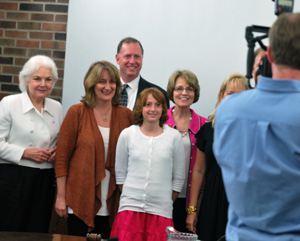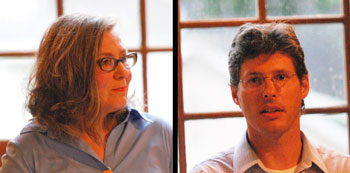University of Michigan Board of Regents meeting (July 15, 2010): Pete Arbour and his 12-year-old daughter Lilly are on a mission to meet all of their elected officials – local, state and national. They carry a list of the 115 people, and mark off those they meet by putting a smiley face next to their names. (All of the city councilmembers in their Rochester Hills hometown are checked off, but president Barack Obama is not.)

Pete Arbour and his daughter Lilly, who live in Rochester Hills, are on a mission to meet with all of their elected officials – including University of Michigan regents. A UM photographer took a photo of them with regents after the July 15 meeting. From left: Julia Darlow, Andrea Fischer Newman, Pete Arbour, Lilly Arbor, Mary Sue Coleman, Denise Ilitch. (Photos by the writer.)
The pair added five more names to the “met” category on Thursday, when they attended the UM regents meeting. They got their photo taken with regents and president Mary Sue Coleman after the meeting. During the meeting, they had a chance to see presentations, some rare public disagreement among board members, and votes on a range of items.
The disagreement stemmed from a proposal to lower the distribution rate on the university’s endowment from 5% to 4.5%. Tim Slottow, UM’s chief financial officer, made the case that the change will help protect the core of the endowment’s value. Julia Darlow, the board’s new chair, argued that they shouldn’t spend less at a time when families are struggling, noting that much of the payout goes toward financial aid and instruction. Other regents disagreed with her and the change was approved, with Darlow and Denise Ilitch dissenting.
Regents also voted – in each case, unanimously – to approve designs for three construction projects: at Crisler Arena, a golf indoor practice facility, and the Institute for Social Research, which is building an addition. Architects for each project gave presentations of the schematic designs before the votes.
Also unanimous was a vote to approve a $1.25 million purchase of assets of the Michigan Information Technology Center Foundation (MITC), located in the South State Commons on Oakbrook Drive. As a result of the sale – a voluntary turnover foreclosure – the university will be taking over MITC’s computing resources. Regents approved two conflict-of-interest disclosures as part of the deal, with regent Katherine White recusing herself from the votes.
Leaders of the Clements Library and the UM Film Office both gave presentations to the board, featuring celebrities past (George Washington, Abraham Lincoln) and present (Pierce Brosnan, Rob Reiner). Regents also heard a report from the chair of the Committee on the Economic Status of the Faculty, who in general indicated that the overall status was good, but could be better. Specific recommendations to improve conditions were outlined.
Finally, the meeting’s only speaker during public commentary, a board member of the UM Student Sustainability Initiative, described for regents a vision of “zero waste” sporting events. They tried it at a football tailgate last fall, and will aim for a zero waste men’s basketball game against Harvard in December. The ultimate goal: An entire campus that doesn’t send any material to the landfill or incinerator. [Full Story]








